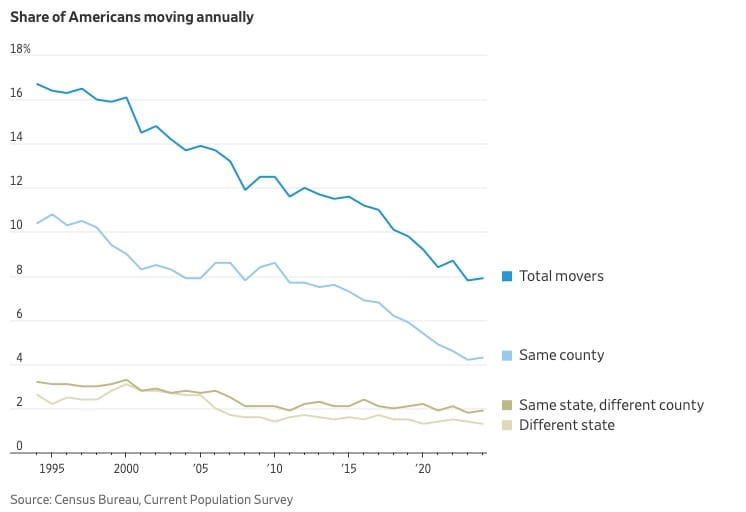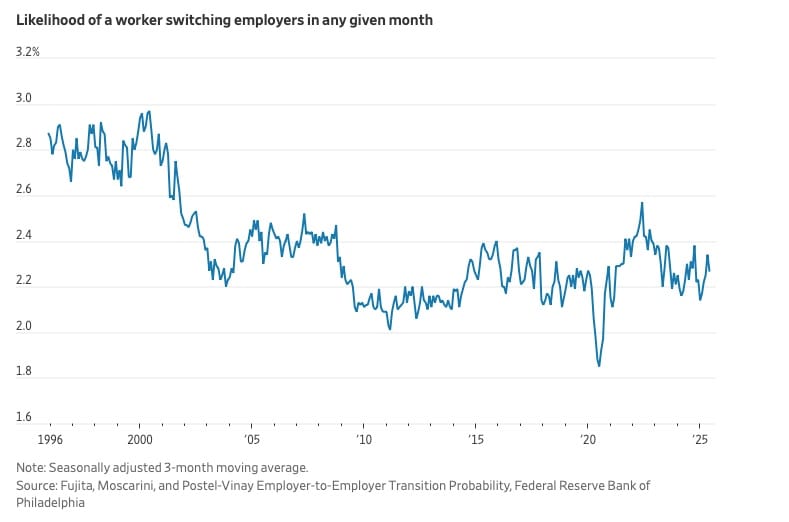Top 5 US news stories
August 15 2025

With Clashing Agendas, Trump and Putin to Meet in Alaska for Ukraine Talks
The Great American Stall I: Mobility in Housing and Jobs Hits Record Low
The Great American Stall II: Housing 'Lock-In' Effect Fuels Record-Low American Mobility
The Great American Stall III: Job-Hopping Hits Lowest Level Since 2009
Trump Administration in Talks to Take Government Stake in Intel
Newsletter sponsor

1. With Clashing Agendas, Trump and Putin to Meet in Alaska for Ukraine Talks
A. ANCHORAGE, Alaska—By meeting Russian President Vladimir Putin on Friday, President Trump is hoping to forge in person what he hasn’t been able to accomplish by phone—a partnership with the Kremlin leader to end the war in Ukraine. Putin is coming to Alaska with a very different goal: keeping in Trump’s good graces while pursuing his longer-term ambition of reasserting Moscow’s dominance over Kyiv. Their high-stakes talks at a military base on the outskirts of Anchorage will prove a revealing test of wills over which of the two presidents will back down, even if only temporarily, to avoid a breakdown in relations that neither seems to want. After initially playing down the summit as a “feel-out meeting,” Trump in recent days has said he would urge Putin to accept a cease-fire in Ukraine, seeking to jump-start long-stalled negotiations. If Putin agrees, Trump says he will bring Ukrainian President Volodymyr Zelensky into the talks, potentially flying him to Alaska for in-depth conversations about a longer term peace agreement involving territorial concessions, security guarantees for Ukraine, and U.S. arm sales to Kyiv. Should Putin balk, Trump is threatening Moscow with “very severe consequences,” possibly including sanctions on major buyers of Russian oil, such as China. The U.S. could also decide to withdraw from the peace process altogether, he said, leaving Moscow and Kyiv to continue the conflict that has killed hundreds of thousands of people.
WSJ
B. President Vladimir V. Putin of Russia is scheduled to meet with President Trump in Alaska this week to discuss the war in Ukraine. If they talk about Ukrainian land concessions as part of peace negotiations, as Mr. Trump has suggested, they will be doing so on land that Russia sold to the United States in 1867. That won’t be the only historical irony. Russia was moved to sell Alaska partly because of a war in Crimea, a peninsula that the Russian Empire annexed in 1783 under Catherine the Great. Crimea became part of an independent Ukraine in 1991, and Russia seized it in 2014 in a preview of its full-scale invasion of Ukraine in 2022. As ironies go, “it doesn’t get much better than that on a grand historical scale,” said Pierce Bateman, a historian at the University of Alaska Anchorage, referring to the location of the Trump-Putin summit.
NYT
2. The Great American Stall I: Mobility in Housing and Jobs Hits Record Low
Americans are stuck in place. People are moving to new homes and new cities at around the lowest rate on record. Companies have fewer roles for entry-level workers trying to launch their lives. Workers who do have jobs are hanging on to them. Economists worry the phenomenon is putting some of the country’s trademark dynamism at risk. For generations, Americans have chased opportunity by moving from city to city, state to state. U.S. companies were often quicker to hire—and to fire—than employers in other parts of the world. But that defining mobility has stalled, leaving many people in homes that are too small, in jobs they don’t love or in their parents’ basements looking for work. Others are slapped with “golden handcuffs.” Those who bought homes when mortgage rates were low or have stable white-collar jobs are clinging to them rather than taking big leaps. This immobility has economic consequences for everyone. The frozen housing market means growing families can’t upgrade, empty-nesters can’t downsize and first-time buyers are all but locked out. When people can’t move for a job offer, or to a city with better job opportunities, they often earn less. When companies can’t hire people who currently live in, say, a different state, corporate productivity and profits can suffer. Young graduates who don’t land good jobs soon after college often never really recover from those years of diminished earnings, widening the gap between the economy’s winners and losers.
WSJ
3. The Great American Stall II: Housing 'Lock-In' Effect Fuels Record-Low American Mobility
In the 1950s and ’60s, some 20% of Americans would typically move each year. The share of people moving has steadily slowed since then, in part because the U.S. population has aged, and older people tend to move less. By 2019, the year before the Covid pandemic, 9.8% of Americans moved. During Covid, there was a well-publicized increase in people decamping farther away from work and deeper into the suburbs. That surge was brief. In 2023, only 7.8% of Americans moved, the lowest rate logged since U.S. Census records began in 1948. That figure held relatively steady in 2024, the most recent data available. For much of the 2010s, a median-income family who bought a median-priced home spent 30% or less of their earnings on housing costs, according to brokerage Redfin. That share is now 39%. Last year, home sales fell to the lowest level in almost 30 years. John Burns Research and Consulting estimates the share of U.S. households moving to a different metro area has fallen by 29% since 2021.

WSJ
4. The Great American Stall III: Job-Hopping Hits Lowest Level Since 2009
A measure of hiring, quits and layoff activity in a range of mostly white-collar industries—the number of people being hired or leaving their jobs divided by the size of the workforce—fell last year to its lowest level since 2009. The share of people switching jobs declined between the 1980s and the 2010s, according to an analysis of census data by Minneapolis Fed economist Abigail Wozniak and colleagues. In the late 1990s, the probability that a worker would switch employers in any month averaged around 2.8%, according to data from the Philadelphia Fed. That is down to an average of 2.3% in the 2020s so far. Recent college graduates who are underemployed are more than three times as likely to be underemployed a decade later than those who quickly secure a good job, a recent study by the Burning Glass Institute found. Part of the long-term nationwide decline in mobility is because more women work full-time and they earn more money than before, said John Jones, an economist at the Richmond Fed. Rising expenses have made a dual-income household more of a necessity for many families. Couples where both people work had the lowest levels of interstate mobility of any group in an analysis by Jones.

WSJ
5. Trump Administration in Talks to Take Government Stake in Intel
The Trump administration is in talks with Intel Corp. to have the US government take a stake in the beleaguered chipmaker, according to people familiar with the plan, in the latest sign of the White House’s willingness to blur the lines between state and industry. A deal would help shore up Intel’s planned factory hub in Ohio, said the people, who asked not to be identified because the deliberations are private. The company had once promised to turn that site into the world’s largest chipmaking facility, though it’s been repeatedly delayed. The size of the potential stake isn’t clear. The talks come just a week after President Donald Trump had called for the ouster of Intel Chief Executive Officer Lip-Bu Tan, accusing him of being “highly conflicted” because of his earlier ties to China.
Bloomberg
August 15 2021: Kabul falls to the Taliban after U.S. withdrawal
On August 15, 2021—just two weeks before U.S. troops were set to officially withdraw from Afghanistan—Taliban leaders enter the capital city of Kabul and sweep back into power with little resistance. The Afghan government collapses, the country’s president Ashraf Ghani flees, and many desperate Afghan civilians are left behind. The withdrawal ended a two-decade war that began in 2001 after the 9/11 terrorist attacks with the aim to destroy Al Qaeda, the terrorist group behind the attacks, and oust the Taliban that was refusing to hand over mastermind Osama bin Laden to the U.S.

Found a mistake? Have a news tip or feedback to share? Contact our newsroom using the button below:
citizen journal offers three flagship products: a daily national news summary, a daily Kansas news summary, and local news and school board summaries from 12 cities across Kansas. Each issue contains 5 paragraph-length stories that are made to be read in 5 minutes. Use the links in the header to navigate to national, kansas, and local coverage. Subscribe to each, some, or all to get an email when new issues are published for FREE!
Sponsors (click me!)





Sources
- https://www.wsj.com/politics/national-security/trump-putin-head-to-high-stakes-alaska-summit-with-clashing-objectives-b380ca64?mod=hp_lead_pos1
- https://www.nytimes.com/2025/08/15/world/europe/russia-alaska-purchase-ukraine.html
- https://www.wsj.com/economy/american-job-housing-economic-dynamism-d56ef8fc?mod=hp_lead_pos7
- https://www.wsj.com/economy/american-job-housing-economic-dynamism-d56ef8fc?mod=hp_lead_pos7
- https://www.wsj.com/economy/american-job-housing-economic-dynamism-d56ef8fc?mod=hp_lead_pos7
- https://www.bloomberg.com/news/articles/2025-08-14/trump-administration-is-said-to-discuss-us-taking-stake-in-intel?srnd=homepage-americas
See the citizen journal Podcast! Released on Apple, Spotify and YouTube around 10a CST.

